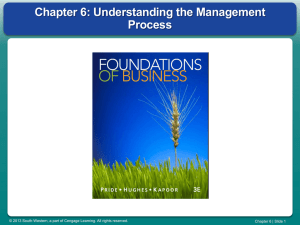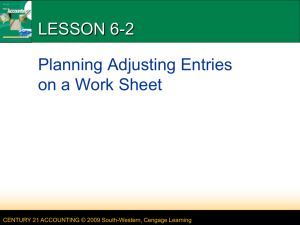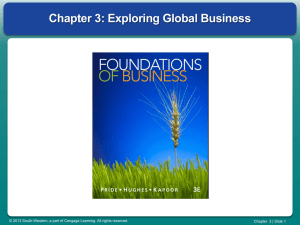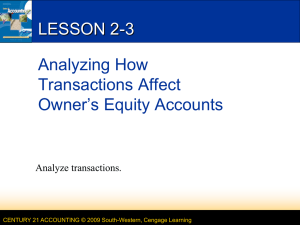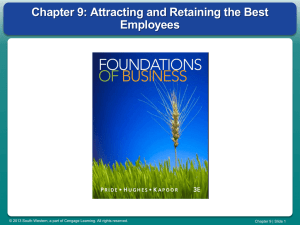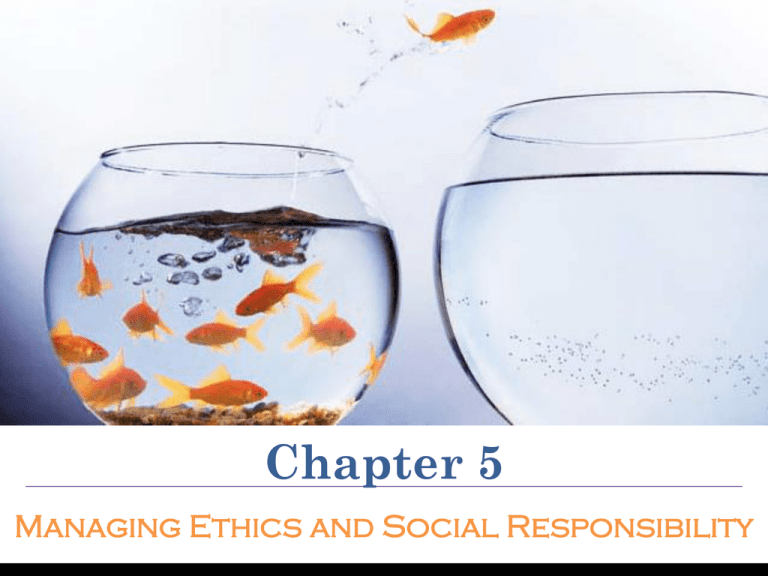
Chapter 5
Managing Ethics and Social Responsibility
Managerial Ethics
• Ethics - code of moral principles and values that
govern the behaviors of right or wrong
• Standards about good/bad
• Ethical issues can be complex
• People in organizations have divergent views
about right/wrong
Copyright ©2012 by South-Western, a division of Cengage Learning. All rights reserved.
2
5.1 Three Domains of
Human Action
Copyright ©2012 by South-Western, a division of Cengage Learning. All rights reserved.
3
Ethical Management Today
• Ethical scandals during the last decade have
been pervasive
• Corporations and people have become
associated with greed, deceit, irresponsibility,
and lack of moral conscience
• Managers carry a big responsibility for setting an
ethical climate
• Ethical crises have brought ethical management
to the forefront
Copyright ©2012 by South-Western, a division of Cengage Learning. All rights reserved.
4
5.2 Examples of Unethical and
Illegal Organizational Behavior
Copyright ©2012 by South-Western, a division of Cengage Learning. All rights reserved.
5
Ethical Dilemmas
You are the moral agent, what would you do?
Your company requires a terrorist watch list that
screens all new customers and takes approximately 24
hours from the time an order is placed. You can close
a lucrative deal with a potential long-term customer
overnight, even though that means the required
watch-list screening will have to be done after the fact.
Copyright ©2012 by South-Western, a division of Cengage Learning. All rights reserved.
6
Criteria for Ethical
Decision Making
• Utilitarian Approach – moral behavior produces the
greatest good for the greatest number
• Individualism Approach – acts are moral if they
promote the individu
al’s
long-term interest
• Moral-Rights Approach – humans have
fundamental rights and liberties that cannot
be taken away by an individual's decision
Copyright ©2012 by South-Western, a division of Cengage Learning. All rights reserved.
7
Criteria for Ethical
Decision Making
• Justice Approach – moral decisions must be
based on standards of equity, fairness, and
impartiality
• Virtue Ethics Approach– moral behavior stems
from personal virtues
• Practical Approach– bases decisions on
prevailing standards, society, and all stakeholders
Copyright ©2012 by South-Western, a division of Cengage Learning. All rights reserved.
8
A Manager’s Ethical Choices
Individuals bring their own personality and traits
to organizations
Personal needs, family influence, and religious
background shape individuals
Personality characteristics like ego, confidence,
and independence
Copyright ©2012 by South-Western, a division of Cengage Learning. All rights reserved.
9
5.3 Three Levels of Personal
Moral Development
Copyright ©2012 by South-Western, a division of Cengage Learning. All rights reserved.
10
What is Corporate Social
Responsibility (CSR)?
• Distinguishing right from wrong; doing right
• Good corporate citizenship
• Make choices that contribute to society and
stakeholders
• Stakeholders – any group within or outside
Copyright ©2012 by South-Western, a division of Cengage Learning. All rights reserved.
11
5.4 Major Stakeholders Relevant to
Monsanto Company
Copyright ©2012 by South-Western, a division of Cengage Learning. All rights reserved.
12
The Green Movement
• Going GREEN is a new business imperative
– Change in social attitudes
– New governmental policies
– Climate change
• Information technology immediately spreads the
negative decisions of corporations
• More organizations are embracing sustainability
Copyright ©2012 by South-Western, a division of Cengage Learning. All rights reserved.
13
The Ethic of Sustainability
Sustainability – economic development
that generates wealth and meets the needs
of current population while preserving the
environment for the needs of future
generations
Copyright ©2012 by South-Western, a division of Cengage Learning. All rights reserved.
14
5.5 Criteria of Corporate
Social Performance
Copyright ©2012 by South-Western, a division of Cengage Learning. All rights reserved.
15
Managing Company Ethics and
Social Responsibility
Code of Ethics – a formal statement of the
company’s values regarding ethics and
social issues
Ethical Structures – systems, positions,
and programs like ethics training
Whistle-blowing – employee disclosure of
illegal, immoral, or illegitimate practices
Copyright ©2012 by South-Western, a division of Cengage Learning. All rights reserved.
16
5.6 Building an Ethical
Organization
Copyright ©2012 by South-Western, a division of Cengage Learning. All rights reserved.
17
The Business Case for Ethics and
Social Responsibility
Ethics and social responsibility
are important business issues
Stakeholders are pushing more
initiatives and issues
The connection between ethics
and financial performance has
been widely debated
What do you THINK?
Copyright ©2012 by South-Western, a division of Cengage Learning. All rights reserved.
18
Enron Scandal - Arthur Anderson
Scandal (2001)
• Enron – an energy brokerage house that was top ten in
Fortune 500 list as of 2001.
• Arthur Anderson – the most prestigious accounting firm
at the time; Enron was its client
• Illegal collusion between Enron & Arthur Anderson
• System Failure: Arthur Anderson provided consulting
services that helped Enron cook the financials, which
was supposed to be audited by Arthur Anderson.
• Investors lost confidence on financial information, and
fled the stock.
Copyright ©2012 by South-Western, a division of Cengage Learning. All rights reserved.
19
Sarbanes-Oxley Act (SOX, 2001)
• 3 Major Impacts by SOX [Lee, 2012]:
1. Internal Control System
2. No longer consulting services
3. Accountability
• SOX helped restore investors’ confidence in the stock
market.
Copyright ©2012 by South-Western, a division of Cengage Learning. All rights reserved.
20
Lincoln Law - Whistle Blow Act
• Background – Civil War; President Lincoln drafted this
law to punish war profiteers who ripped off the U.S.
federal government.
• When you discover your firm’s wrongdoings such as tax
evasion, you hire a Lincoln law specialist lawyer, and file
a lawsuit against your firm; the judge will rule in favor of
you, and grant big reward to you.
• Big reward = about half of the money that the federal
government would recover from your firm.
Copyright ©2012 by South-Western, a division of Cengage Learning. All rights reserved.
21
Tax, Corporate Responsibility, &
Economic Sustainability
• “Tax loopholes – Big corporations’ business at offshore” [WSJ
article, 2012.09.20]
• Who gets most benefit from the government? => Big corporations
• Big corporations argue less tax & smaller government, but who
protects their wealth (police)? Who trains their workforce (public
education: K-12 & state universities)? Who provide
infrastructures (road, utility, Internet fiber optics cables, etc.)?
• Using such tax loopholes will make them hard to gain respect &
support from customers & American people, which leads to the
serious risk to their economic sustainability.
• 2 minute speech on Fair Taxation by Professor Elizabeth Warren
of Harvard Law School: http://www.youtube.com/watch?v=htX2usfqMEs
Copyright ©2012 by South-Western, a division of Cengage Learning. All rights reserved.
22
Fair Taxation: Marginal Tax vs.
Flat Tax
• Marginal Tax - 40% with deductions:
–
–
–
–
Suppose you made $1,000,000.
With help of creative accounting, you made deductions of $900,000
Taxable income is only $100,000.
You pay about 30% tax, $30,000. In short, your effective tax rate is only 3%; that is,
$30,000 tax on $1,000,000 income.
– This is how billionaires pay less than 5% with help by creative accountants & tax
lawyers, while most pay above 15% effective tax rates.
– Is this really a progressive system?
– Note: Ordinary middle class citizens do not afford to hire such expensive
accountants & tax lawyers, ending up only standard deductions.
• Flat Tax – say, 10% on revenue or income; no deduction;
– Big corporations, billionaires all pay 10% on their income, no matter what. No
deductions what so ever!
– In the above case, you will pay $100,000 tax.
Copyright ©2012 by South-Western, a division of Cengage Learning. All rights reserved.
23
Tax Evasion & Economic
Sustainability [Lee, 2012]
•
•
•
•
•
•
•
Suppose you are an owner/president of a private firm; You made $1,000,000 in net
profit, which is taxable at 40%. $400,000 is expected to pay the tax.
Now, you want to reduce the tax amount. It is human nature to be greedy.
You coerce the staff (in-house accountants) to cook the numbers by manipulating &
increasing the deductions, e.g. creating fake expense accounts, etc.
Once you steal the firm’s money, your staff will start to steal the money. Soon,
everyone will steal the company money & resources.
Even when you discover the steals, you cannot charge them to the police because you
initiated this illegal activity yourself, & the staff threats that they will report your
wrongdoings to the police.
Economic Sustainability: The company cannot sustain with such wrongdoings when
everyone steals from it.
Conclusion: If you want to leave the firm to your son & to grandson, (1) set the high
ethical standards, and show you actually are serious about the ethics. (2) Build an
internal control system to make everyone keep honest. Do not make employees
tempted to embezzle the company money. Don’t evade the tax!
Copyright ©2012 by South-Western, a division of Cengage Learning. All rights reserved.
24
Ethics & The U.S. Economic
Sustainability [Lee, 2012]
• The U.S. may not look perfect, but still the U.S. stock
markets and corporate culture are most admired by the
world because they are more transparent, more systemcontrolled, and less corrupt than any other countries.
• The U.S. economic sustainability entirely depends on
maintaining such high ethical standards in government
and industry.
• Do not forget a lesson from the fall of the Roman
Empire: Corruptions, greed & unethical behavior by the
ruling class ruined the Roman Empire.
Copyright ©2012 by South-Western, a division of Cengage Learning. All rights reserved.
25

